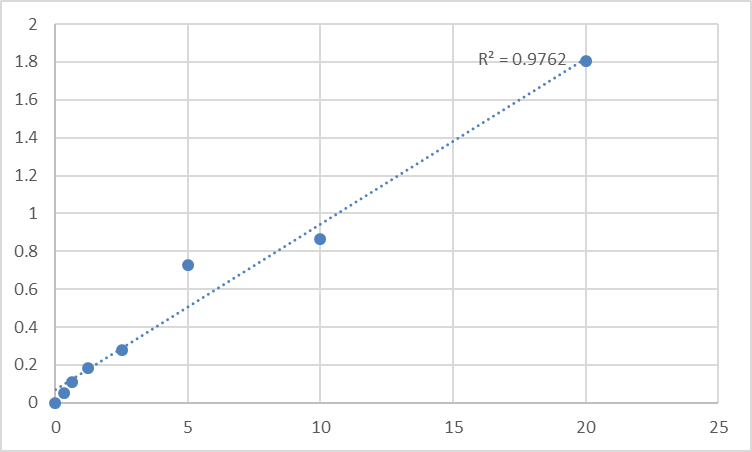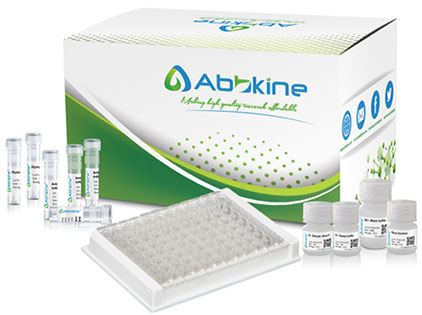| Product name | Mouse Eosinophil cationic protein (ECP) ELISA Kit |
| Reactivity | Mouse |
| Applications | ELISA |
| Applications notes | This Mouse Eosinophil cationic protein (ECP) ELISA Kit employs a two-site sandwich ELISA to quantitate ECP in samples. An antibody specific for ECP has been pre-coated onto a microplate. Standards and samples are pipetted into the wells and anyECP present is bound by the immobilized antibody. After removing any unbound substances, a biotin-conjugated antibody specific for ECP is added to the wells. After washing, Streptavidin conjugated Horseradish Peroxidase (HRP) is added to the wells. Following a wash to remove any unbound avidin-enzyme reagent, a substrate solution is added to the wells and color develops in proportion to the amount of ECP bound in the initial step. The color development is stopped and the intensity of the color is measured. |
| Detection method | Colorimetric |
| SampleType | Cell culture supernatants, Other biological fluids, Plasma, Serum |
| Assay type | Sandwich ELISA (quantitative) |
| Assay duration | Multiple steps standard sandwich ELISA assay with a working time of 3-5 hours. It depends on the experience of the operation person. |
| Alternative | ECP |
| Kit components | • Mouse Eosinophil cationic protein microplate • Mouse Eosinophil cationic protein standard • Mouse Eosinophil cationic protein detect antibody • Streptavidin-HRP • Standard diluent • Assay buffer • HRP substrate • Stop solution • Wash buffer • Plate covers |
| Features & Benefits | Mouse Eosinophil cationic protein (ECP) ELISA Kit has high sensitivity and excellent specificity for detection of Mouse ECP. No significant cross-reactivity or interference between Mouse ECP and analogues was observed. |
| Calibration range | Please inquire |
| Limit of detection | Please inquire |
| Usage notes | • Do not mix components from different kit lots or use reagents beyond the kit expiration date. • Allow all reagents to warm to room temperature for at least 30 minutes before opening. • Pre-rinse the pipet tip with reagent, use fresh pipet tips for each sample, standard and reagent to avoid contamination. • Unused wells must be kept desiccated at 4 °C in the sealed bag provided. • Mix Thoroughly is very important for the result. It is recommended using low frequency oscillator or slight hand shaking every 10 minutes. • It is recommended that all samples and standards be assayed in duplicate or triplicate. |
| Storage instructions | The unopened kit should be stored at 2 - 8°C. After opening, please store refer to protocols. |
| Shipping | Gel pack with blue ice. |
| Precautions | The product listed herein is for research use only and is not intended for use in human or clinical diagnosis. Suggested applications of our products are not recommendations to use our products in violation of any patent or as a license. We cannot be responsible for patent infringements or other violations that may occur with the use of this product. |
| Background | Three immunization procedures were compared for the production of antibodies to the minor components of a complex E. coli protein (ECP) mixture: a conventional protocol and two methods that allow for the selective in vitro (cascade) or in vivo (passive) depletion of highly immunogenic proteins.An E. coli protein, designated ω, has been purified at least 1000-fold. Treatment of a eovalently closed DNA duplex containing negative superhelical turns with ω results in the loss of most of the superhelical turns. The loss of superhelical turns follows a gradual course rather than a one-hit mechanism. This reaction does not require a cofactor. No other change in the physical properties of the DNA could be detected. ω is capable of introducing a “swivel” reversibly into a DNA. A plausible mechanism is postulated. |
| Alternative | ECP |

Fig.1. Mouse Eosinophil cationic protein (ECP) Standard Curve.

Fig.2. Abbkine ELISA kit is series of sandwich ELISA to quantitate specific protein in samples.
Author:Hangyu Xu, Hairong Shu, Jie Zhu, Jianxin Song Publication name:Experimental and Therapeutic Medicine IF:1.5
You must be logged in to post a review.
Reviews
There are no reviews yet.